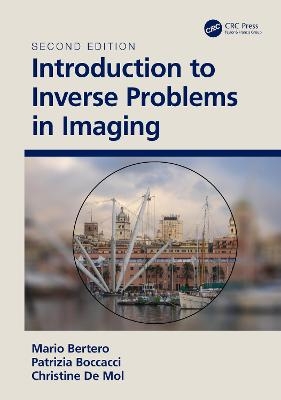
Introduction to Inverse Problems in Imaging
Seiten
2022
|
2nd edition
CRC Press (Verlag)
978-0-367-47005-0 (ISBN)
CRC Press (Verlag)
978-0-367-47005-0 (ISBN)
Fully updated throughout, with several new chapters, this second edition of Introduction to Inverse Problems in Imaging guides advanced undergraduate and graduate students in physics, computer science, mathematics and engineering through the principles of linear inverse problems.
Fully updated throughout and with several new chapters, this second edition of Introduction to Inverse Problems in Imaging guides advanced undergraduate and graduate students in physics, computer science, mathematics and engineering through the principles of linear inverse problems, in addition to methods of their approximate solution and their practical applications in imaging.
This second edition contains new chapters on edge-preserving and sparsity-enforcing regularization in addition to maximum likelihood methods and Bayesian regularization for Poisson data.
The level of mathematical treatment is kept as low as possible to make the book suitable for a wide range of students from different backgrounds, with readers needing just a rudimentary understanding of analysis, geometry, linear algebra, probability theory, and Fourier analysis.
The authors concentrate on presenting easily implementable and fast solution algorithms, and this second edition is accompanied by numerical examples throughout. It will provide readers with the appropriate background needed for a clear understanding of the essence of inverse problems (ill-posedness and its cure) and, consequently, for an intelligent assessment of the rapidly growing literature on these problems.
Key features:
Provides an accessible introduction to the topic while keeping mathematics to a minimum
Interdisciplinary topic with growing relevance and wide-ranging applications
Accompanied by numerical examples throughout
Fully updated throughout and with several new chapters, this second edition of Introduction to Inverse Problems in Imaging guides advanced undergraduate and graduate students in physics, computer science, mathematics and engineering through the principles of linear inverse problems, in addition to methods of their approximate solution and their practical applications in imaging.
This second edition contains new chapters on edge-preserving and sparsity-enforcing regularization in addition to maximum likelihood methods and Bayesian regularization for Poisson data.
The level of mathematical treatment is kept as low as possible to make the book suitable for a wide range of students from different backgrounds, with readers needing just a rudimentary understanding of analysis, geometry, linear algebra, probability theory, and Fourier analysis.
The authors concentrate on presenting easily implementable and fast solution algorithms, and this second edition is accompanied by numerical examples throughout. It will provide readers with the appropriate background needed for a clear understanding of the essence of inverse problems (ill-posedness and its cure) and, consequently, for an intelligent assessment of the rapidly growing literature on these problems.
Key features:
Provides an accessible introduction to the topic while keeping mathematics to a minimum
Interdisciplinary topic with growing relevance and wide-ranging applications
Accompanied by numerical examples throughout
Mario Bertero is a Professor at the Università di Genova. Patrizia Boccacci is a Professor at the Università di Genova. Christine De Mol is a Professor at the Université libre de Bruxelles.
1. Introduction. 2. Examples of image blurring. 3. The ill-posedness of image deconvolution. 4. Quadratic tikhonov regularization. 5. Iterative regularization methods. 6. Examples of linear inverse problems. 7. Singular value decomposition (SVD). 8. Inversion methods revisited. 9. Edge-preserving regularization. 10. Sparsity-enforcing regularization. 11. Statistical approaches to linear inverse problems 12. Statistical methods in the case of additive Gaussian noise 13. Statistical methods in the case of Poisson data 14. Conclusions
| Erscheinungsdatum | 22.12.2021 |
|---|---|
| Zusatzinfo | 4 Tables, black and white; 73 Line drawings, black and white; 47 Halftones, black and white; 9 Illustrations, color; 111 Illustrations, black and white |
| Verlagsort | London |
| Sprache | englisch |
| Maße | 178 x 254 mm |
| Gewicht | 840 g |
| Themenwelt | Informatik ► Grafik / Design ► Digitale Bildverarbeitung |
| Mathematik / Informatik ► Mathematik ► Angewandte Mathematik | |
| Naturwissenschaften ► Physik / Astronomie ► Angewandte Physik | |
| Naturwissenschaften ► Physik / Astronomie ► Optik | |
| Technik | |
| ISBN-10 | 0-367-47005-5 / 0367470055 |
| ISBN-13 | 978-0-367-47005-0 / 9780367470050 |
| Zustand | Neuware |
| Informationen gemäß Produktsicherheitsverordnung (GPSR) | |
| Haben Sie eine Frage zum Produkt? |
Mehr entdecken
aus dem Bereich
aus dem Bereich
alles zum Drucken, Scannen, Modellieren
Buch | Softcover (2024)
Markt + Technik Verlag
24,95 €
Modelle für 3D-Druck und CNC entwerfen
Buch | Softcover (2022)
dpunkt (Verlag)
34,90 €


